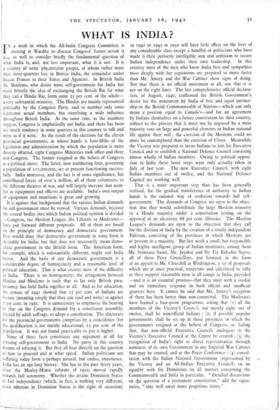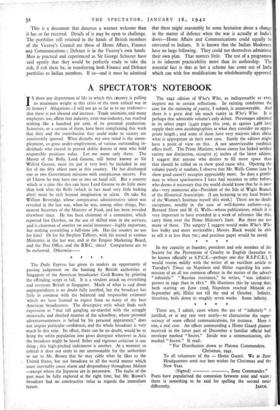WHAT IS INDIA?
T N a week in which the All-India Congress Committee is 1 meeting at Wardha to discuss Congress' future action it Indy oe well to consider briefly the fundamental question of what India is, and, not less important, what it is not. It is a country of some 389,000,000 people, of whom rather more than three-quarters live in British India, the remainder under Inaian Princes in their States and Agencies. In British India the Moslems, who desire more self-government for India but resist bitterly the idea of exchanging the British Raj for what they call a Hindu Raj, form some 25 per cent. of the whole— a very substantial minority. The Hindus are mainly represented politically by the Congress Party, said to number only some 1,500,000 actual members, but exedising a wide influence throughout British India. At the same time, as the numbers suggest, Congress is emphatically not India, and there has been too much tendency in some quarters in this country to talk and write as if it were. As the result of the elections for the eleven provincial governments, in whose hands is four-fifths of the legislation and administration by which the population is more directly affected, eight Congress Ministries took office and three non-Congress. The former resigned at the behest of Congress as a political move. The latter, now numbering four, governing a population of 100,000,000, are at present functioning success- fully. India moreover, and the fact is of some significance, has contributed forces of over -a million, all of them volunteers, to the different theatres of war, and will largely increase that num- ber as equipment and officers are available. India's own output of equipment and munitions is great and growing.
It is against that background that the various Indian demands for self-government must be viewed. Various demands, because the several bodies into which Indian political opinion is divided —Congress, the Moslem League, the Liberals or Moderates— have put forward different proposals. All of them are based on the principle of democracy and democratic government. Few would deny that democratic government in some form is desirable for India, but that does not necessarily mean demo- cratic government in the British form. The American form, for example, which is substantially different, might suit India better. And the basis of any democratic government is a considerable degree of homogeneity and a reasonable level of political education. That is what creates most of the difficulty in India. There is no homogeneity; the antagonism between Hindus and Moslems is such that so far only British para- mountcy has held India together at all. And as for education, the census of 1941 showed that 12 per cent. of Indians are literate (meaning simply that they can read and write) as against 7 per cent. in 1931. It is unnecessary to emphasise the bearing of that on the Congress demand for a constituent assembly, elected by adult suffrage, to adopt a constitution. The electorate for the provincial governments comprises by a coincidence (for the qualification is not mainly educational) 12 per cent. of the Population. It was not found practicable to put it higher.
None of these facts constitutes any argument at all for refusing self-government to India. No party in this country dreams of refusing it. But they all bear directly on the question of how to proceed and .at what speed. Indian politicians are suffering today from a perhaps natural, but undue, impatience. India has an age-long history. She has in the past thirty years, since the Morley-Minto reforms of 1910, moved rapidly towards full autonomy. Whether she attains Dominion Status or full independence (which, in fact, is nothing very different, since inherent in Dominion Status is the right of secession) in 1942 or 1945 or 1950 will have little effect on the lives of any considerable class except a handful of politicians who have made it their perfectly intelligible aim and ambition to secure Indian independence under their own leadership. In this country most of the men who know India best and sympathise most deeply with her aspirations are prepared to move faster than Mr. Amery and the War Cabinet show signs of doing. Not that there is no official movement at all, nor that it is not on the right lines. The last comprehensive official declara- tion, of August, 1940, reaffirmed the British Government's desire for the attainment by India of free and equal partner- ship in the British Commonwealth of Nations—which can only mean a position equal to Canada's—and for an agreement by Indians themselves on a future constitution for their country, subject to the proviso that it must not be imposed by a mere majority vote on large and powerful elements in Indian national life against their will ; the coercion of the Moslems could no more be contemplated than the coercion of Ulster. Meanwhile the Viceroy was prepared to invite Indians to join his Executive Council and to establish a National Defence Council consisting almost wholly of Indian members. Owing to political opposi- tion in India these latter steps were only actually taken in July of last year. The new Executive Council, with eight Indian members out of twelve, and the National Defence Copncil are working well.
That is a more important step than has been generally realised, for the gradual transference of authority to Indian hands is the rational way of evolution towards full self- government. The demands of Congress are open to the objec- tion that they would subordinate the large Moslem minority to a Hindu majority under a constitution resting on the approval of an electorate 88 per cent. illiterate. The Moslem League's demands are open to the objection that they call for the division of India by the creation of a totally independent Pakistan, consisting of the provinces in which Moslems are at present in a majority. But last week a small, but responsible and highly intelligent, group of Indian moderates, among them Mr. Srinivasa Sastri, Mr. Jayakar and Sir Tej Bahadur Sapru, all of them Privy Councillors, put forward, in the form of an appeal to Mr. Churchill at Washington, a set of proposals which are at once practical, temperate and calculated to rally to their support reasonable men in all camps in India, provided —and it is an essential proviso—that they meet with a cordial and an immediate response in both official and unofficial quarters here. It cannot be said that Mr. Amery's reception of them has been better than non-committal. The Moderates have framed a four-point programme, asking that (r) all the members of the Viceroy's Council, not merely eight out of twelve, shall be nonofficial Indians ; (2) if possible popular governments shall be set up in those provinces in which the governments resigned at the behest of Congress, or. failing that, that non-official Executive Councils analogous to the Viceroy's Executive Council at the Centre be created ; (3) the recognition of India's right to direct representation through nominees of its own Government in any Imperial War Cabinet that may be created, and at the Peace Conference ; (4) consul- tation with the Indian National Government (represented by the Viceroy and an All-Indian Executive Council) on an equality with the Dominions on all matters concerning the Commonwealth and India in particular. "Detailed discussions on tlie question of a permanent constitution," add the signa- tories, "may well await more propitious times." This is a document that deserves a warmer welcome than it has so far received. Details of it may be open to challenge. The portfolios still retained in the hands of British members of the Viceroy's Council are those of Home Affairs, Finance and Communications ; Defence is in the Viceroy's own hands. Men as practical and experienced as Sir George Schuster have said openly that they would be perfectly ready to take the risk, if risk there be, in transferring both Finance and Defence portfolios to Indian members. If so—and it must be admitted that there might reasonably be some hesitation about a change in the matter of defence when the war is actually at India's doors—Home Affairs and -Communications could equally be entrusted to Indians. It is known that the Indian Moderates have no large following. They could not themselves administer their own plan. That matters little. The test of a programme is its inherent practicability more than its authorship. The essential fact is that at last a scheme has come out of India which can with few modifications be wholeheartedly approved.



























 Previous page
Previous page